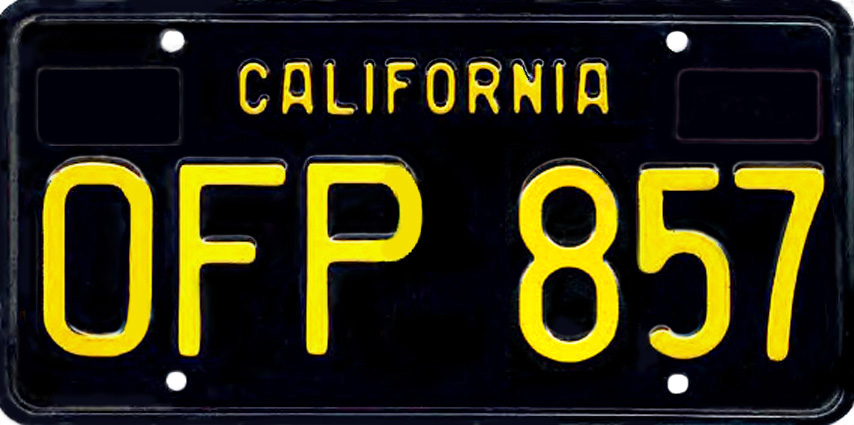Officers regularly run license plate checks to learn the ownership of an abandoned vehicle, verify whether the vehicle is stolen and randomly check plates while on routine patrol. Often, vehicle registration checks lead to other evidence of criminal activity. As It Is With Strangers By Susan Beth Pfeffer Pdf Printer. No doubt, checking license plates is an excellent tool to obtain a wealth of information. But are the owners of the plates and vehicle registrations entitled to keep that information private?
In other words, what do officers need by way of reasonable suspicion or probable cause to run the license plate? The answer: Nothing, as long as police officers legitimately observe the license plate. No Plate Privacy Many courts have addressed the issue of whether police officers need probable cause or reasonable suspicion to run computerized checks on license plates under a variety of circumstances. The question is not whether officers can stop a vehicle once the computer check reveals a criminal and/or traffic violation. The question is whether officers need probable cause or reasonable suspicion to run the computer check in the first place.
Jan 15, 2017. OK, so you've got someone's license plate number. If you head online to try and track down the name and address behind it, you'll find a near-endless array of promises from license plate lookup companies. They'll offer things like “free license plate lookups”, “instant results”, and even “unlimited. I don't have a New York State Driver License, Permit or Non-Driver ID. How can I check my registration status? You can order an official document. See vehicle registration and title records (abstracts). 1 You will need the document number (see sample documents) from your most recently issued document. If you renewed. Officers regularly run license plate checks to learn the ownership of an abandoned vehicle, verify whether the vehicle is stolen and randomly check plates while on. A license plate lookup or search is a way to get information about a vehicle. A more common method of getting this type of information is a VIN check, but a license plate search is also a good option, depending on the state you reside in. If the VIN is not readily available and you have the license number of the vehicle in.
Despite the underlying circumstances, the courts don t hesitate in asserting that a motorist has no expectation of privacy in the license plate number of his vehicle. So, when police officers randomly run the registration of vehicles for no reason other than to check the information, there is no Fourth Amendment violation. Free Print To Pdf Converter there. For example, in United States v. Walraven, an Albany County, Wyo., deputy sheriff observed two men driving a 1983 brown Cadillac bearing a Tennessee license plate.
The deputy routinely ran the license plates on out-of-state vehicles. After asking his dispatcher to do a computerized check on the Cadillac s vehicle registration, the deputy was informed that the plate number belonged to a 1988 Toyota. The deputy decided to stop the Cadillac on that information alone. After stopping the vehicle and engaging the occupants in a conversation relating to the purpose of the traffic stop, the deputy located a bag containing 2 kilos of cocaine. The deputy arrested both occupants. The owner of the vehicle (who was the passenger at the time of the traffic stop) appealed the district court s denial of his motion to suppress the evidence of the cocaine, alleging the deputy obtained the contraband in violation of the Fourth Amendment.


Specifically, the owner challenged the constitutionality of the deputy s registration check of his vehicle. The appellate court s analysis of the deputy s method in establishing reasonable suspicion to stop the vehicle was succinct. In short, it held that because license plates are in plain view, no privacy interest exists in the license plates. Another federal appellate court stated, Like the area outside the curtilage of a dwelling, a car s license plate number is constantly open to the plain view of passersby [and] unless a registration check reveals information which raises a reasonable suspicion of criminal activity, the subject remains unaware of the check and unencumbered. Incorrect Plate Information What if an officer runs a computer check of a license plate and mistypes or misstates one of the license plate characters? What if a dispatcher mistypes or misstates the information? What if, as a result of the officer s or dispatcher s mistake, the vehicle is stopped, the driver is briefly detained and contraband is seized?
Of course, any officer finding contraband in plain view can arrest the driver of the vehicle. However, isn t the contraband tainted because the officer and/or the dispatcher incorrectly communicated the vehicle registration? Not necessarily so. In general, if the officer and/or dispatcher acted in good faith in running the registration, the subsequent traffic stop and/or search resulting in the seizure of contraband will not be suppressed. In United States v. Leon, the Supreme Court rationalized the use of the exclusionary rule would not deter improper police conduct where an officer engaged in objectively reasonable law enforcement activity: In short, where the officer s conduct is objectively reasonable, excluding the evidence will not further the ends of the exclusionary rule in any appreciable way. Naturally, it s the prosecutor s burden to demonstrate the officer s conduct was objectively reasonable.